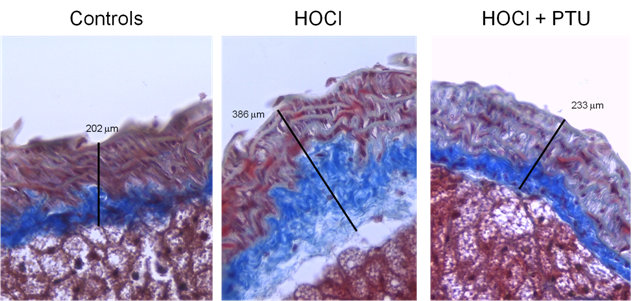Session Information
Session Type: Abstract Submissions (ACR)
Background/Purpose: Systemic sclerosis (SSc) is a generalized connective tissue disorder of unknown etiology characterized by thickening and fibrosis of the skin and distinctive visceral involvement associated with vascular damage. Traditionally, the vasculopathy of SSc has been considered mainly to affect small arteries and capillaries but there is recent evidence showing that SSc is also associated with large vessel disease. Increased aortic augmentation index and pulse wave velocity in comparison to age and sex matched healthy controls indicate large-vessel involvement in patients with SSc. A second , and as yet poorly accounted for, endocrine feature of scleroderma is its overlap with thyroid abnormalities. Recent experimental data suggest that propylthiouracil (PTU) abrogates the development of cutaneous and pulmonary fibrosis in SSc murine model and reduces the development of plexiform lesions in an animal model of primary pulmonary hypertension. The aim of the study is therefore to evaluate the effect of propylthiouracil administration on intima-media (IM) thickness and ratio in a murine model of systemic sclerosis.
Methods: Chronic oxidant stress SSc was induced in BALB/c mice by daily subcutaneous injections of HOCl for 6 weeks, characterized in detail as the Cochin chronic oxidant stress model of SSc . Mice (n=25) were randomized in three arms: treatment with either propylthiouracil plus HOCl (n=10), HOCl (n=10), or vehicle alone (n=5). Propylthiouracil treatment (12 mg/kg) was initiated 30 minutes after HOCl subcutaneous injection and continued daily for the 6 weeks. Thoracic aorta was evaluated by histological methods. IM thickness and ratio were measured for statistical analysis.
Results: HOCl injections induced an increase in aortic IM thickness when compared to controls by 101% (p<0.0001). In mice treated with HOCl and PTU there was a 86% reduction of IM thickness (p<0.0001). PTU treated animals had a significantly thinner intima layer (-13%, p<0.0001) and media layer (-198%, p<0.0001) compared to HOCl group. IM ratio was also decreased in HOCl treated mice compared to controls (0.72 vs 1.76, p<0.0001) and significantly increased by PTU administration (1.62 vs 0.72, p<0.0001).
Conclusion: Our data suggest that PTU, probably through its antioxidant direct effect or indirectly through thyroid function inhibition , substantially moderates the increase of aortic thickness found in HOCl treated animals reducing collagen deposition in media layer and aortic fibrotic changes.
Disclosure:
G. Bagnato,
None;
A. Bitto,
None;
G. Pizzino,
None;
N. Roberts,
None;
D. Altavilla,
None;
F. Squadrito,
None;
G. Bagnato,
None;
A. Saitta,
None.
« Back to 2013 ACR/ARHP Annual Meeting
ACR Meeting Abstracts - https://acrabstracts.org/abstract/propylthiouracil-attenuates-aortic-vasculopathy-in-an-animal-model-of-systemic-sclerosis/

